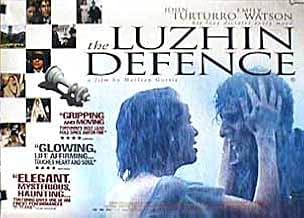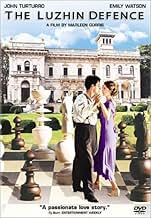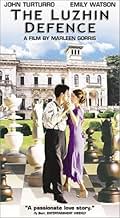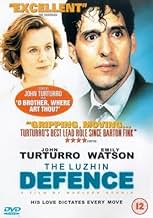Two worlds collide when an eccentric genius falls in love with a strong-willed society beauty.Two worlds collide when an eccentric genius falls in love with a strong-willed society beauty.Two worlds collide when an eccentric genius falls in love with a strong-willed society beauty.
- Director
- Writers
- Stars
- Awards
- 3 wins & 2 nominations total
- Director
- Writers
- All cast & crew
- Production, box office & more at IMDbPro
6.84.9K
1
2
3
4
5
6
7
8
9
10
Featured reviews
A good movie but too much literary baggage
'The Luzhin Defence' is a good film with fine central performances, but too much of the novel and not enough of the filmmaker's craft shines through. It felt through most of the film that the characters just helped to push the narrative along. Marlene Gorris could perhaps have examined the psyche of Luzhin, rather than depicting him as a tortured innocent victim torn apart by the cruel motives of others.
Adapting literature for the screen is clearly a difficult task, especially a novel written in the early 20th century. This film does not go deeply enough into the relationship between Luzhin and Natalia. Natalia's rift with her mother comes across a churlish disagreement by the mother rather than a dramatic flashpoint in the film. I felt that I was put through Luzhin's torment and eventual tragic end, without being given the pleasure of having his unusual and complex personality unravelled. However, this was a moving and enjoyable film but certainly not a great one.
Adapting literature for the screen is clearly a difficult task, especially a novel written in the early 20th century. This film does not go deeply enough into the relationship between Luzhin and Natalia. Natalia's rift with her mother comes across a churlish disagreement by the mother rather than a dramatic flashpoint in the film. I felt that I was put through Luzhin's torment and eventual tragic end, without being given the pleasure of having his unusual and complex personality unravelled. However, this was a moving and enjoyable film but certainly not a great one.
Probably not a buy, but a worthy rental for an evening at home.
John Turturro, Emily Watson, Geraldine James, Stuart Wilson; directed by Marleen Gorris, loosely based on the novel by Vladimir Nabokov The Luzhin Defence is set in nineteen-twenties Italy's lake district where the world championships of Chess are being staged. Our hero Luzhin (Turturro) is a main contender for the title and recognized as one of the greatest chess minds of the era. He is utterly consumed by game, and has utterly devoted his life to the contest since a young age. It has been both obsession and addiction for the man, as it is both all he knows and what gives his life meaning. While competing in the championships, he meets Natalia (Watson), a wealthy socialite. Showing his peculiarity, he immediately asks her to marry him, sight unseen. Intrigued by his straight forward manner, she does not immediately dismiss him.
This is due to the fact that she is here for her mother to choose a suitor for her, and Luzhin's eccentricity is seen by her as a welcome change. Her mother (James) is completely taken aback by such an idea, and wants her daughter to marry someone of similar prestige and means. All of this transpires while his old chess teacher (Wilson) tutors his chief rival, wanting nothing more than to see Luzhin humiliated.
Being a chess movie, it could immediately be set aside as dull and unwatchable, being as Chess is not exactly a spectator sport.
However, this movie is much less about chess and much more about the people surrounding the game; making it a piece about the interactions of personalities and not pieces. The movie does find a parallel however, as it is shown like a chess match between two sides, the present and the past (shown through flashbacks), with one side prevailing at the end. This storytelling choice works surprisingly well, as we gain much insight as to why Luzhin is the way he is, and how he views the world.
The movie begins with a telling piece of cinematography, as the audience is given the perspective of a train conductor emerging from a tunnel. This is especially significant when viewed in the sense of Luzhin's later mental breakdown, and can be seen as meaning the same thing. This scene is then segued into the first flashback, giving us a pattern that can be seen in the rest of the film. Other notable scenes include the meeting of Natlalia and Alexander at a tennis court, and later when he is thinking to himself in their bedroom, "There is a pattern emerging!" cries the eccentric chess genius Alexander Luzhin. "I must keep track--every second!" To which Natalia, whom he loves can only reply, "It sounds like such a lonely battle.' This all encompassing effect of chess on him can also be seen earlier in the film, as he is being driven by one of his old chess teachers chauffeurs into the middle of the countryside, is dropped off there, and does not notice. The end adds character to the film without being overly dramatic, but is a departure from the finish of the novel, however it is believable and adds to the sense that Luzhin does not really control himself, or know how.
Overall an enjoying piece of film, more about camera angles and people then chess. After the first half, the films pace drastically speeds up, and the plot becomes much more intriguing. Can best be compared to other independent films of its ilk, yet also suffices quite well as a period piece. Probably not a buy, but a worthy rental for an evening at home.
This is due to the fact that she is here for her mother to choose a suitor for her, and Luzhin's eccentricity is seen by her as a welcome change. Her mother (James) is completely taken aback by such an idea, and wants her daughter to marry someone of similar prestige and means. All of this transpires while his old chess teacher (Wilson) tutors his chief rival, wanting nothing more than to see Luzhin humiliated.
Being a chess movie, it could immediately be set aside as dull and unwatchable, being as Chess is not exactly a spectator sport.
However, this movie is much less about chess and much more about the people surrounding the game; making it a piece about the interactions of personalities and not pieces. The movie does find a parallel however, as it is shown like a chess match between two sides, the present and the past (shown through flashbacks), with one side prevailing at the end. This storytelling choice works surprisingly well, as we gain much insight as to why Luzhin is the way he is, and how he views the world.
The movie begins with a telling piece of cinematography, as the audience is given the perspective of a train conductor emerging from a tunnel. This is especially significant when viewed in the sense of Luzhin's later mental breakdown, and can be seen as meaning the same thing. This scene is then segued into the first flashback, giving us a pattern that can be seen in the rest of the film. Other notable scenes include the meeting of Natlalia and Alexander at a tennis court, and later when he is thinking to himself in their bedroom, "There is a pattern emerging!" cries the eccentric chess genius Alexander Luzhin. "I must keep track--every second!" To which Natalia, whom he loves can only reply, "It sounds like such a lonely battle.' This all encompassing effect of chess on him can also be seen earlier in the film, as he is being driven by one of his old chess teachers chauffeurs into the middle of the countryside, is dropped off there, and does not notice. The end adds character to the film without being overly dramatic, but is a departure from the finish of the novel, however it is believable and adds to the sense that Luzhin does not really control himself, or know how.
Overall an enjoying piece of film, more about camera angles and people then chess. After the first half, the films pace drastically speeds up, and the plot becomes much more intriguing. Can best be compared to other independent films of its ilk, yet also suffices quite well as a period piece. Probably not a buy, but a worthy rental for an evening at home.
Defenseless you will be to the charms of this film, all romance lovers out there!
Alexandr "Sascha" Luzhin (John Turturro) is a former leading chess player attempting a comeback at an Italy-hosted tournament. His brilliance is unquestioned but his obsession with chess has stunted his growth in all other aspects of his life. Natalia (Emily Watson) is a beautiful heiress who has come to the same resort with her mother, Vera (Geraldine James) to scope out possible marriage partners. Vera leans toward a handsome count but, astonishingly, Natalia is more fascinated by Sascha, whom she met on a walk. Sascha, too, is taken with Natalia and proposes marriage at their second meeting. But, with the concentration that Sascha must give to the chess matches and, with other happenings in his past still causing problems, will he win the heart of Natalia? Oh, and can he become the chess champion, also? This is a lovely film, based on a novel by Nabokov. The acting is amazing, with Watson very fine as the beautiful little rich girl and Turturro utter perfection as the shy, awkward chess enthusiast. James gives quite a nice turn as the overbearing mother and the other cast members are wonderful as well. As for the look of the film, it could not be better. The scenery is of the put-your-eye-out variety, the vintage costumes are gorgeous and the cinematography is deserving of much applause. Yes, the story is unusual and told with the use of flashbacks, at times, making it a film not everyone will appreciate. Then, too, the ending is bittersweet. However, if you love romance, period pieces, great acting, knockout scenery, or the fine art of motion picture creation, don't miss this one. You will be defenseless in resisting its multitude of charms.
Nice Drama, Bad Chess
As a costume drama, this movie is a success.
The decor is marvelous, the dialogues intense and the acting of top-level.
But as a chess film this makes absolutely no sense.
It's like a film about a chef cook that tries to combine salmon with rice cakes or pancake syrup.
On the other hand, it is nice that it introduces the audience to some concepts of chess - chess notation (the 'recipe') and some ingredients like the isolated queen's pawn, quiet moves, mating net, and rook sacrifice.
But as a chess player I can confirm that the board setups don't make any sense. One of the rook moves is illegal since it's pinned.
And in the final game, only an amateur would play gxh3 after Rh3. Because any professional would see that trap. With a piece up there are plenty of good moves for white, for example the bishop is hanging. No way black can win that.
In other words, the movie is called Luzhin Defense but there is no Luzhin Defense. That's what the chess player is watching for!
So that's basically the only criticism I have: if you make a chess film, the chess has to be correct. And to show a world-champion level game, the true brilliance has to be found. Because to us this is a scam.
It's not that hard with plenty of chess coaches and computer engines around. They should have done a bit more consulting with John Speelman at the time if the rook sac is all he was able to give them!
The decor is marvelous, the dialogues intense and the acting of top-level.
But as a chess film this makes absolutely no sense.
It's like a film about a chef cook that tries to combine salmon with rice cakes or pancake syrup.
On the other hand, it is nice that it introduces the audience to some concepts of chess - chess notation (the 'recipe') and some ingredients like the isolated queen's pawn, quiet moves, mating net, and rook sacrifice.
But as a chess player I can confirm that the board setups don't make any sense. One of the rook moves is illegal since it's pinned.
And in the final game, only an amateur would play gxh3 after Rh3. Because any professional would see that trap. With a piece up there are plenty of good moves for white, for example the bishop is hanging. No way black can win that.
In other words, the movie is called Luzhin Defense but there is no Luzhin Defense. That's what the chess player is watching for!
So that's basically the only criticism I have: if you make a chess film, the chess has to be correct. And to show a world-champion level game, the true brilliance has to be found. Because to us this is a scam.
It's not that hard with plenty of chess coaches and computer engines around. They should have done a bit more consulting with John Speelman at the time if the rook sac is all he was able to give them!
Had To Watch It Again
It was riveting the first time and equally so the second time. I couldn't stand to miss one word. I guess I was hooked on it. It dwarfs A Beautiful Mind; I don't know how you rated that one. The movie leaves you excited about being obsessed with anything you really love. I think it was the story that grabbed me, not whatever failings someone is guessing the film has. The beauty of loving Sasha, someone who is NOT off the yuppie assembly line. However, the good-heartedness of the yuppie (the mother's choice). The good-heartedness of Sash's opponent. The evil of only one bad apple. Its a beautiful world that must exist outside of reality. Certainly outside the borders of my country. It is what movies do...make us dream and wish it could be true.
Did you know
- TriviaThe Luzhin Defence (2000) was shot entirely in Europe. Budapest, Hungary was used for outdoor scenes as they were set in St Petersburg, these included the Széchenyi Chain Bridge, Hungarian National Museum and Heroes' Square. The chess tournament (although in Italy) was shot inside the main hall of the Museum of Ethnography, Budapest. In Italy, the hotel scenes were filmed at Villa Erba, Cernobbio, on the Lake Como. The scene at the railway station is in Brenna-Alzate, near Como.
- GoofsIn his game as white against an unnamed opponent before the final, Luzhin is shown supposedly checkmating with Rd1-d8, which is an illegal move because his rook at d1 is pinned against his king on h1 by black's rook at c1.
- Quotes
Aleksandr Ivanovich Luzhin: There's a pattern emerging, a definite pattern. Not Turati. I repeat that game. I've beaten him. And his moves are repeated, repeated, repeated moves. I must keep track... of every second. Every second I must keep track of, every second.
Natalia Katkov: It sounds like such a lonely battle.
- SoundtracksJazz Suite No. 2: VI. Waltz 2
Written by Dmitri Shostakovich (as Dimitri Shostakovich)
Performed by Koninklijk Concertgebouworkest (as Royal Concertgebouw Orchestra)
Conducted by Riccardo Chailly
By permission of Boosey & Hawkes Licensing
Courtesy of Decca Record Label Ltd.
Under license from Universal Special Markets
(p) 1992 Decca Records
- How long is The Luzhin Defence?Powered by Alexa
Details
- Release date
- Countries of origin
- Languages
- Also known as
- The Luzhin Defense
- Filming locations
- Budapest, Hungary(St Petersburg scenes)
- Production companies
- See more company credits at IMDbPro
Box office
- Gross US & Canada
- $1,053,070
- Opening weekend US & Canada
- $63,203
- Apr 22, 2001
- Gross worldwide
- $1,873,620
- Runtime
- 1h 49m(109 min)
- Color
- Sound mix
- Aspect ratio
- 1.85 : 1
Contribute to this page
Suggest an edit or add missing content



































